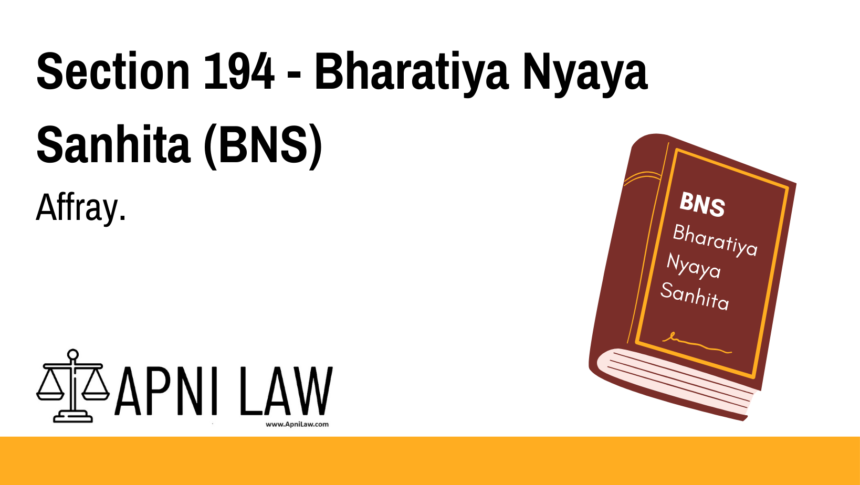Code: Section 194 BNS – Affray
(1) When two or more persons, by fighting in a public place, disturb the public
peace, they are said to commit an affray.
(2) Whoever commits an affray, shall be punished with imprisonment of either description
for a term which may extend to one month, or with fine which may extend to one thousand
rupees, or with both.
Explanation of Section 194 BNS
Section 194 of the Bharatiya Nyaya Sanhita (BNS), 2023, deals with the offence of affray, which refers to public fighting that disrupts public peace and order.
Key Elements of Affray Under Section 194 BNS
- Involvement of Two or More People – At least two individuals must engage in fighting.
- Public Place Requirement – The fight must occur in a public area (e.g., streets, markets, parks, railway stations).
- Disturbance of Public Peace – The fight must cause public disorder or distress.
- Punishment – The offence is punishable with:
- Imprisonment up to one month, or
- A fine up to ₹1,000, or
- Both imprisonment and fine.
Illustration of Affray Under Section 194 BNS
Example 1: A Street Fight in a Market
Two individuals engage in a heated argument in a crowded marketplace, which escalates into a physical fight. This disrupts the normal functioning of the market, causing fear and panic. Both individuals can be charged under Section 194 BNS.
Example 2: A Brawl at a Public Railway Station
A group of people start fighting at a railway station, creating chaos among passengers. Since it’s a public place and disturbs public peace, they can be prosecuted for affray under Section 194 BNS.
Common Questions and Answers on Section 194 BNS
1. What is the difference between affray and rioting?
- Answer:
- Affray (Section 194 BNS) involves two or more people fighting in a public place, disturbing the public peace.
- Rioting (Section 191 BNS) involves an unlawful assembly using violence to achieve a common objective.
2. Can affray be committed in a private place?
- Answer: No. For an offence to be classified as affray under Section 194 BNS, it must take place in a public area.
3. Is affray a bailable offence?
- Answer: Yes, affray is a bailable offence, meaning the accused can seek bail from the court.
4. Is affray a cognizable or non-cognizable offence?
- Answer: Affray is a non-cognizable offence, which means the police require prior permission from the court to arrest the accused.
5. What is the maximum punishment for affray under Section 194 BNS?
- Answer: The maximum punishment for affray is one month of imprisonment or a fine of ₹1,000, or both.
Conclusion
Section 194 BNS ensures public order by penalizing individuals who engage in public fights that disturb peace. Since it is a bailable and non-cognizable offence, the punishment is relatively mild. However, repeated offences or involvement in serious public disturbances may lead to stricter legal consequences.
For more legal insights, visit ApniLaw today! 🚀








